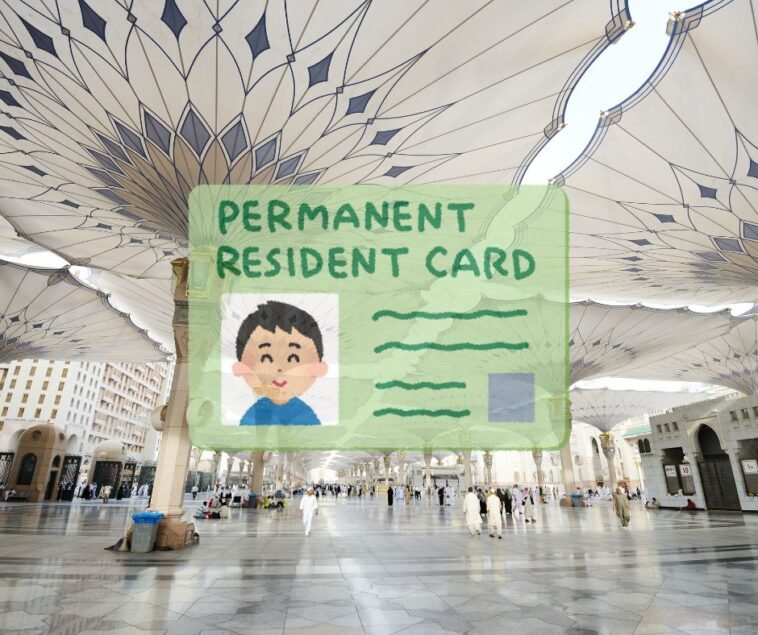Saudi Arabia has earned a reputation as a country that welcomes a significant number of expatriates in search of job opportunities. To legally work in the country, expatriates are required to possess a residence permit called Iqama, which must be renewed in a timely manner. This article aims to provide a comprehensive understanding of Iqama renewal, covering various aspects related to the process.
Table of Contents
What is Iqama?
In terms of immigration and labor policy compliance, the government of Saudi Arabia maintains strict regulations outlined in the Saudi Labor Law. As an expatriate seeking employment in the country, it is essential to have a local sponsor, usually an employer. The sponsor acts on behalf of the employee to obtain the work permit and residency card, which is commonly known as Iqama in Saudi Arabia. Once an employment contract is secured, along with all required documentation, the expatriate is legally permitted to reside and work in the Kingdom.
The validity of the Iqama and work permit typically corresponds to the duration of the employment contract, which may range from several months to one year. Therefore, in many cases, expatriates need to renew their Iqama before it expires.
Iqama Renewal Fees 2023:
Iqama renewal entails certain fees, and it’s essential to be aware of the most common ones to prepare for the process:
2.1 MOI Iqama Issuance and Renewal Fees 2023:
The standard fee for issuing or renewing an Iqama is SAR 650. In line with the new rules for Iqama renewal, employers now have the flexibility to pay the fee in different installments based on the desired duration, as follows:
- One-year validity fee: SAR 650.
- 3-month validity fee: SAR 163.
- 6-month validity fee: SAR 325.
- 9-month validity fee: SAR 488.
2.2 Work Permit Fee or Maktab Amal Fees 2023:
The employer is also responsible for paying the work permit fee, known as Maktab Amal, for the employee’s renewal. The fee is charged on a monthly basis and must be paid for a minimum of three months at a time. The fee structure is as follows:
- 3-month fee: SAR 2,400.
- 6-month fee: SAR 4,800.
- 9-month fee: SAR 7,200.
- Yearly fee: SAR 9,600.
2.3 Expat Dependent Fees 2023:
Expatriates who sponsor dependents in Saudi Arabia are required to pay additional fees for each dependent during the Iqama renewal process. The fee is SAR 400 per dependent on a monthly basis. However, employers have the option to pay it every three months, resulting in the following fees:
- 3-month fee: SAR 1,200.
- 6-month fee: SAR 2,400.
- 9-month fee: SAR 3,600.
- 12-month fee: SAR 4,800.
2.4 Iqama Renewal Fee Calculator:
Calculating Iqama renewal fees can be complex, as they depend on the number of months required for both Iqama and work permit renewal, as well as the number of dependents under an individual’s sponsorship. Regardless of an individual’s earnings, the fee remains the same for all expatriates. To determine the total renewal fee, the applicable formula considers the duration of Iqama and work permit renewal, along with the number of dependents.
For example, if an expatriate plans to renew Iqama and work permit for three months without any dependents, the total fee would be the sum of the Iqama 3-month fee (SAR 163) and the work permit 3-month fee (SAR 2,400), totaling SAR 2,563. If the same individual has one dependent, they would need to add SAR 1,200 to the total, resulting in SAR 3,763. It is important to note that this cost estimation does not include health insurance expenses.
2.5 Work Permit Fee For Domestic Workers:
As per the new rules for Iqama renewal, the work permit fee for domestic workers varies based on the number of domestic employees hired by the employer. Saudi employers must pay the work permit fee for the fifth domestic worker hired and subsequently, while foreign employers pay for the third domestic worker hired and subsequently.
This means that Saudi employers do not have to pay the work permit fee for the first four domestic workers, and foreign employers do not have to pay for the first two domestic workers.
2.6 Levy Exemptions for Small Businesses:
Since the introduction of the new rules for Iqama renewal in 2020, small businesses with fewer than nine employees, including at least one full-time Saudi national, have been granted an exemption from hiring foreign professionals for up to two workers. This exemption remains valid until March 2024. If the small business hires an additional Saudi national, the exemption increases to cover four foreign workers.
3. Iqama Renewal Process in Saudi Arabia:
As Iqama renewal is a periodic requirement, it is essential to be well-informed about the process, such as the possibility of free Iqama renewal for three months and the applicable fees. Expatriates with dependents under their sponsorship are also required to pay the dependent levy during the Iqama renewal process, as stipulated in the Saudi new rules for Iqama renewal in 2021.
To proceed with the Iqama renewal, it is advisable to understand the process and meet the necessary requirements:
3.1 Requirements for Renewing the Iqama:
To successfully renew the Iqama, the expatriate employee must fulfill the following requirements:
- Pay the Iqama renewal fees.
- Pay the fee for the work permit.
- Settle any traffic fines, if applicable, before proceeding with the renewal.
- Hold a valid health insurance policy.
- Pay the dependent fee, if applicable.
To determine the total amount due for renewal, individuals should check their identity card for any outstanding fines, as this information is necessary for accurate calculation.
Once it is confirmed that all requirements are met, the employer can initiate the Iqama renewal process on behalf of the employee.
3.2 Responsibility for Iqama Renewal:
expatriate employees, the responsibility for Iqama renewal lies solely with their respective employers. The employer is also required to cover the fees associated with the renewal process. As such, employees need not fill out an application form or pay for the renewal themselves. The only condition for employees with dependents is that they must pay the dependent levy for each dependent they sponsor.
If an employer refuses to renew an employee’s Iqama or neglects to cover the renewal fees, it is important for the employee to be aware that this is not allowed according to Saudi labor regulations. In such cases, employees have the right to file a complaint regarding any labor-related issues they may encounter.
3.3 Step-by-step Process for Iqama Renewal:
The Iqama renewal process has become more streamlined with the introduction of online procedures. Employers can now renew Iqama up to six months in advance, and they can also initiate the renewal process even if the expatriate employee is outside Saudi Arabia. Below are the steps an employer needs to follow to renew an employee’s Iqama:
- Visit the official portal of Muqeem.
- If the website appears in Arabic by default, there is an option to switch the language to English by clicking on the corresponding icon located at the top of the page.
- Use the employer’s credentials to log in to the portal.
- Click on “Electronic Transactions.”
- Select “Iqama renewal.”
- Enter the security code received on the employer’s mobile phone.
- Input the Iqama number of the employee.
- Choose the desired Iqama duration (options usually include 3, 6, 9, or 12 months).
- Click on “Submit” to initiate the renewal process.
Upon completion of these steps, the Iqama will be automatically renewed for the chosen duration.
3.4 Consequences of Late Iqama Renewal:
As a resident of Saudi Arabia, it is strongly advised to renew the Iqama at least three days before its expiry date to avoid any complications. If an individual fails to renew their Iqama on time, they will be subject to fines that increase based on the number of days that have passed since the expiration date. The fine structure is as follows:
- First-time late renewal: SAR 500.
- Second-time late renewal: SAR 1,000.
- Third-time late renewal: The employee may face deportation.
To avoid these penalties, employers must visit a Jawazat office to pay the delay fine and request the renewal of the Iqama. However, if an expatriate wishes to leave Saudi Arabia, they must request their employer to cancel their work permit and residency. It is crucial for employers not to delay the visa cancellation process to prevent any unnecessary complications, as seeking external support may be necessary in such cases.
Iunderstanding the process of Iqama renewal in Saudi Arabia is essential for both expatriate employees and their employers. Being informed about the requirements, fees, and procedures involved can help ensure a smooth and timely renewal process, allowing expatriates to continue legally residing and working in the Kingdom without any issues. Compliance with Iqama renewal regulations is critical to avoid fines and other potential consequences.
Other Articles you may like
- Popular Beach Clubs in Jeddah, Saudi
- List of popular Supermarkets in Jeddah
- Tawakkalna App – Check out all countries’ travel requirements ( KSA )
- Saudi Arabia allows expats to change jobs without waiting a year ( New Laws )
- Top 10 Saudi companies in Saudi Arabia
- List of 50 Baby Names banned in Kingdom of Saudi Arabia
- Ways to change the mobile phone number in Absher Services
- How to Check Saudi Arabia Iqama Expiry Online?
- List of Richest People in Saudi Arabia
Please Subscribe Us to get updated with Qatar News, Saudi News, Kuwait News, Health News, UAE News, Iqama, Visa, Jobs, Banking and More.



